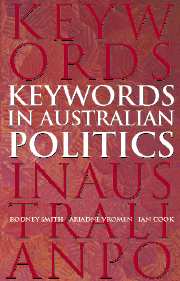Introduction: Why and How You Should Use This Book
Published online by Cambridge University Press: 05 June 2012
Summary
We wrote this book primarily for tertiary students and other people who want to orient themselves quickly to the keywords necessary for understanding contemporary Australian politics. In a series of short entries, the book outlines the main meanings of 101 of these words, highlights the links between them, outlines the main debates surrounding them, provides brief illustrations of their use, and suggests some further reading for those who want to find out more about them.
Keywords such as bureaucracy, executive, identity politics, liberalism, managerialism, separation of powers, social capital and wedge politics are often mentioned without explanation in lectures, textbooks and other materials encountered by people studying Australian politics. These terms are important to the overall arguments being made by lecturers and writers; however, those lecturers and writers tend not to have the time or space to define or elaborate on them. Some students and readers will be at least passingly familiar with at least some of these terms. They can, however, quickly lose the thread of general arguments when they encounter specific terms with which they are unfamiliar. The same points apply to more general audiences exposed to news reporting and commentary on Australian politics.
This book is designed as a tool for students and other people who find themselves wanting to gain basic knowledge about some keywords so that they can understand wider arguments about Australian politics. It is not a textbook.
- Type
- Chapter
- Information
- Keywords in Australian Politics , pp. vii - xvPublisher: Cambridge University PressPrint publication year: 2006



